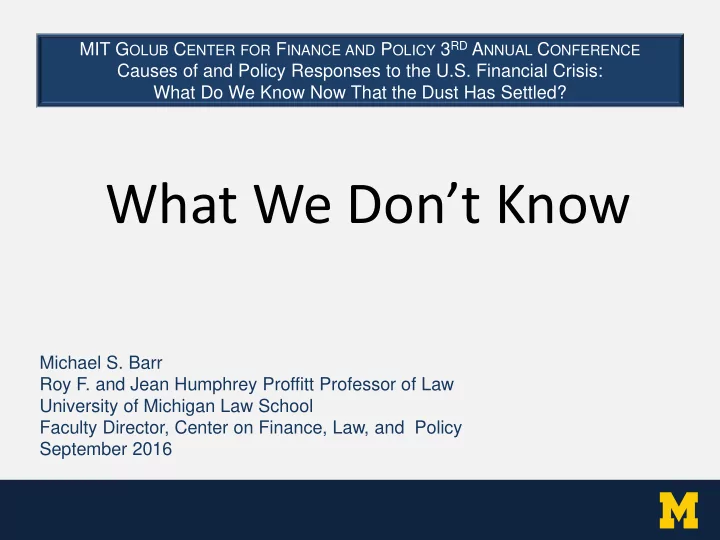

MIT G OLUB C ENTER FOR F INANCE AND P OLICY 3 RD A NNUAL C ONFERENCE Causes of and Policy Responses to the U.S. Financial Crisis: What Do We Know Now That the Dust Has Settled? What We Don’t Know Michael S. Barr Roy F. and Jean Humphrey Proffitt Professor of Law University of Michigan Law School Faculty Director, Center on Finance, Law, and Policy September 2016
Five Things We Don’t Know • What we once knew but have now forgotten • What is knowable but is kept hidden • What we know, but don’t know what it means • What we don’t know that we don’t know • What we should do about things we know
Financial Stability • Theory • Risk data • Risk analytics • Risk management (structure, incentives, supervision, etc.) • Authority & will to act
Analytics • Metrics • Counter-factual • Matrix • Networks • Complex systems • Agent-based modeling • Crowdsourcing • Analogies (e.g., evolutionary biology) – Adaptive, Modular, Redundant, Diverse
Progress • Resolution authority, cross-border MOUs • Capital, liquidity, TLAC • Derivatives, CCPs, ISDA protocols • Stress testing • Supervision
Challenges • Are capital levels high enough? Simple enough? Risk- based enough? Macro enough? • Who holds TLAC? What about knock-on effects? • Global coordination (capital, resolution, derivatives) • CCPs • SFT haircuts & collateral rules, triparty repo • Shadow banking (MMFs, GSEs, Wholesale Funding, Hedge Funds, Asset Management) • Cumulative, interactive effects of complex regulation • Values: accountability, transparency, democracy
Regulating in Uncertainty: Innovation • When and how will regulators balance innovation and risk? – ETFs • ETFs prone to runs • Synthetic and inverse derivatives amplify and spread risk – High-Frequency Trading • Does High-Frequency Trading undermine financial market stability? Fairness? Efficiency? – FinTech • Consumer protection, payments, bank charter?
What is the frame? • Idiosyncratic vs. systemic risk – What is the tradeoff between islanding and adaptability? • Banking and shadow banking – What is the regulatory perimeter? • National and International – Who’s in charge of global finance?
Five Ways The Financial System Will Fail Next Time • Amnesia (leverage, liquidity, bubbles) • Regulatory arbitrage • Analytic & management failure • Innovation/disruption • Choices & accidents
Building a More Resilient Financial System • Vertical buffers • Horizontal buffers • Regulatory checks and balances • Transparency • Accountability • Corporate governance • Monetary, fiscal, regulatory, tax, social welfare policies • Resiliency vs. other values (cost, growth, access, innovation)
Recommend
More recommend